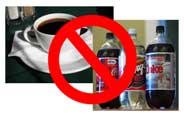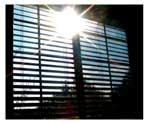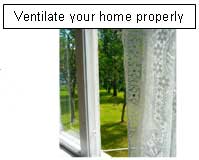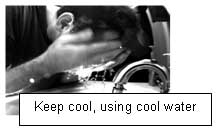Why This is Important
Heat waves kill! Those at greatest risk for heat-related illness include infants and children up to four years old, people older than 65, people who are overweight, and people who are ill or on certain medications. If electricity is out, so is air conditioning.
Take action

- Stay hydrated. Drink at least a cup of water every 20-30 minutes during extreme heat periods in the summer, even if you aren't thirsty. By the time you FEEL thirsty, you are already dehydrated. Avoid soft drinks, caffeine, and alcoholic beverages.
- Cook outside to avoid increasing the heat and humidity inside your house. See: Food, "Emergency Cooking."
- Adjust your diet. Eat small, light meals, spaced throughout the day, rather than 2 or 3 big heavy meals.
- Dress for the season. Inside the house, wear shorts and a light shirt. Loose fitting clothes are cooler and more comfortable than tight fitting garments. Go barefoot or wear sandals. Natural fabrics are cooler than synthetics. At night, use light cotton sheets on your bed.
- Shade is your friend.
- Keep the sun's heat from hitting windows, doors and walls. Shade the outside of the windows.

- Indoor curtains are good, but greater benefit can be achieved by blocking the sun from the inside AND the outside. Light-colored sheets will work for indoor curtains.
- You can tape tinfoil on the inside of a window. Put the shiny side facing the sun.
- Use auto sun shades to make a cheap outdoor window shade. Duct tape 2 or 3 of them together (depending on the size of the window). Hang them on the outside of the windows. A roll-up window shade also works fine.
- Shade the doors.
- Shade your walls with plants.

- Ventilate your house. If it is hotter inside than outside, open the windows and doors for cross flow. If it is hotter outside than inside, and the day is still, then leave everything shut.
- Open every window and door to facilitate cross breezes.
- If the temperature is warmer inside than outside, open the windows and doors. If it is cooler inside than outside, keep the house closed unless there is a good breeze that would further cool the house.
- Minimize outdoor activities. Any work or exercise outdoors generates extra heat. If you must be outside, dress right. Wear:
- A light colored hat
- Light colored and light weight clothing that covers the skin (long sleeves).

- Cooling off. If the heat becomes oppressive, douse your head, arms, and feet with cool water, or go outside and soak yourself with a water hose. Keep a spray bottle of cool water handy, and give yourself spritzes of cool water. Dip cloths in cool water and wrap around your head, neck, armpits and groin.
- Location. Since heat rises, stay on the lowest floor possible. Basements are cooler.